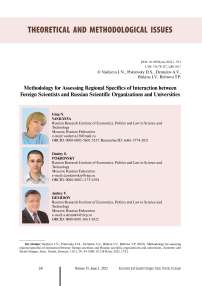Methodology for assessing regional specifics of interaction between foreign scientists and Russian scientific organizations and universities
Автор: Vasilyeva Irina N., Pokrovsky Dmitry S., Demidov Andrey V., Bitkina Inna V., Rebrova Tatyana P.
Журнал: Economic and Social Changes: Facts, Trends, Forecast @volnc-esc-en
Рубрика: Theoretical and methodological issues
Статья в выпуске: 1 т.15, 2022 года.
Бесплатный доступ
The article examines the features of interactions between Russian scientific organizations and universities and foreign scientists. Despite the effort to collect and compile data on different types of international interactions between scientists, Russian academic literature does not pay sufficient attention to the activities of foreign scientists working in Russia. Therefore, the purpose of the study is to close the gaps in scientific knowledge connected to the research on academic mobility including identification of types and features of interactions between Russian scientific organizations and foreign scientists, to discover the connection between academic mobility and productivity of scientists, and to improve methods of arrangement for the data related to the status and performance of the academia. To accomplish this goal, we propose a methodology for monitoring the interaction of Russian organizations with foreign scientists. We carry out the monitoring taking into account the priorities formulated in the Strategy of Scientific and Technological Development of the Russian Federation (hereinafter - STD Strategy of Russia). The monitoring provided the data about the quantity of foreign scientists, who visited Russian scientific organizations and higher education institutions in 2018 and 2019, the statistics on the distribution of foreign scientists working in Russia by age groups, by scientific fields, by types of interaction, and by Russian regions. The following issues require thorough consideration: the choice of parameters for assessing the work of educational and scientific organizations and the need to take into account priorities of STD Strategy of Russia for monitoring and evaluating the interaction between Russian organizations and foreign scientists, the presence or absence of stable links between the mobility of scientists and their scientific productivity, the absence and fragmentation of data on foreign scientists working in Russia, and flaws in the methods for collecting and monitoring such data. The methodology has been tested using data from previous surveys. Following the test, we propose specific steps for improving data collection on broad participation of Russia in global science processes. The obtained results can be used by private and state organizations, including the management of higher education organizations, heads of scientific organizations (scientific departments), which will serve as the basis for accurate positioning of Russia on the world map of scientific and technological cooperation.
Circulation of scientific personnel, researchers, international academic mobility, monitoring, international scientific and technological cooperation
Короткий адрес: https://sciup.org/147237316
IDR: 147237316 | УДК: 314.74:327
Текст научной статьи Methodology for assessing regional specifics of interaction between foreign scientists and Russian scientific organizations and universities
Academic mobility is important for countries seeking to prove themselves in the international arena, it is the key to many of the challenges facing states. These include gaining and maintaining the status of a scientific power, raising and maintaining the level of research, and internationally disseminating own achievements, such as research, technology, and equipment.
In order to formulate science policy, it is important to understand the movement of migration flows, migration trends depending on age, fields of science, and scientific organizations. However, the study of academic mobility is a complex task, and researchers are faced with insufficient and incomplete information, or the inability to process the bodies that may contain this information (e.g., scholarly summaries). With dramatic changes in lifestyles and ways of interacting, there is an increasing demand for research on a large number of parameters.
It is necessary to analyze the features of cooperation of Russian universities and scientific organizations with foreign scientists, which would allow assessing systematically the state and performance of the field of science, technology and innovation, changes in research areas in accordance with the priorities of scientific and technological development of the Russian Federation, due to the features of interaction of Russian organizations with foreign scientists.
Defining the nature, features and problems of interaction between Russian organizations and foreign scientists and developing specific measures for a broader participation of Russia in global processes in science are also relevant because in the era of globalization the successful development of universities and scientific organizations is directly linked to their positioning in the international arena. The level of involvement in international academic exchange is one of the important parameters for assessing the activities of educational and scientific organizations. Universities with leading positions in the world-famous QS World University Rankings and THE World University Rankings invite a significant number of foreign specialists. Thus, the assessment of mobility is associated, among other things, with the performance of organizations, which is important for various rankings of scientific and educational organizations.
Extent of prior research
The Scientific and Technological Development Strategy of the Russian Federation (hereinafter – STD Strategy of Russia) contains the principle of effective interaction of scientific organizations with various groups, including the international community1 (paragraph 34d). An indicator of effective interaction can be the increased scientific productivity of a researcher, but there are different views in the foreign literature on the impact of mobility of scientists on scientific productivity. According to some authors, the advantages of attracting foreign specialists are their research orientation2 (Welch, 1997) and high productivity (Dostie, Leger, 2009; Azoulay et al., 2011; Dubois et al., 2014; Halevi et al., 2016). Others find no connection between the mobility of scientists and their productivity (Bolli, Schlapfer, 2015). Thus, examining data on the mobility of Swedish scientists, O. Ejermo, C. Fasio, and J. Kallstrom conclude that the effects of mobility depend largely on the scientific field (Ejermo et al., 2019). Thus, any analysis of the effectiveness of interactions with foreign scientists requires consideration of particular interactions and their features.
However, identifying the features of interactions with foreign scientists becomes a difficult task because of the paucity of information on the interactions and movement of scientists in the world. (Gahungu, 2011; Gomez et al., 2020). Open statistical information on scientists invited from abroad to Russia (D’yachenko et al., 2017), which is collected as part of the monitoring conducted by the Ministry of Science and Higher Education of the Russian Federation: Monitoring the performance of scientific organizations3 and Monitoring the effectiveness of higher education organizations, according to the team of authors from the HSE University, is fragmentary.
Based on the results of a 2019 international study on the migration of all scientists from the Web of Science Core Collection database for 2008–2015, we have not yet been able to get a deep understanding of migration flows, their directions, and the causes of migration (Robinson-Garsia et al., 2019).
Partially filling the gaps in statistical data and tracing the migration patterns of scientists allow studies of migration of representatives of both individual organizations (Koksharov, Agarkov, 2018) and industries (D’yachenko, 2017; Yurevich, Aushkap, 2018; Antoshchuk, Ledeneva, 2019). In the paper on attraction of highly qualified foreign specialists to Russian universities, B.V. Zheleznev and A.V. Melikyan come to the conclusion that there are rather facilitated procedures for employment of foreign citizens in Russia, but point to the problem of lack of coverage of issues related to activities of foreign scientists in the Russian scientific literature (Zheleznev, Melikyan, 2012). Studies of foreign specialists working in Russia usually deal with the practices of attracting foreign specialists to certain universities in the country4 (Zheleznev, Melikyan, 2012; Drugova et al., 2016).
Types of international scientific and technical cooperation (hereinafter – ISTC) are diverse. K.A. Zadumkin and S.V. Terebova divide them into two large groups – commercial and noncommercial (Zadumkin and Terebova, 2009), which are not limited to the circulation of scientific personnel. The researchers suggest evaluating the effectiveness of other types of ISTC, such as joint preparation of publications by scientists and specialists, participation in international conferences, symposia, etc.
The first attempt to collect and summarize data on the types of interaction of foreign scientists was made in 2019 by the Ministry of Education and Science of Russia with the participation of RIEPL. The study involved 441 organizations that interacted with foreign scientists in 2018. The following information was obtained and summarized: age groups of scientists, their research interests correlated with the priorities of STD Strategy of Russia, the countries from which scientists came, the main areas of interaction, and the Russian organizations that attracted the largest number of foreigners5.
Thus, the processes of interaction of foreign scientists with Russian organizations are observed by Russian and foreign researchers, but require systematic and further comprehension. In our opinion, in order to improve the quality of ongoing research, information should be collected using special techniques, which can improve the efficiency of its processing and interpretation. In our case, this is reflected in the methodology for monitoring the interaction of Russian organizations with foreign scientists, which consists of four areas, generally representing an algorithm for obtaining and processing results.
Research methods
In 2020, the Ministry of Education and Science of the Russian Federation and RIEPL conducted the second monitoring of interaction between Russian scientific organizations and institutions of higher education with foreign scientists6. A total of 976 Russian organizations participated in the monitoring, including 499 organizations that provided information on interaction with foreign scientists in 2019, of which 162 organizations provided facilities of their research infrastructure for use by foreign specialists7 (Zolotarev et al., 2019). Regional branches of organizations in the study were counted as separate organizations. In total, data on 13,722 scientists were obtained in the course of the monitoring.
The algorithm for obtaining and processing the results includes four directions. Such a division is conditional, but at the same time problem-oriented, allowing to fully systematize the survey materials by fields of science, directions and geographical features of interaction, priorities of the STD Strategy of Russia, provision of access to the research infrastructure, etc. (Fig. 1, 2) .
In the first direction, data are presented on the age groups of foreign scientists, their research interests and directions of interaction with Russian scientific organizations and universities. Based on where they came from (EU countries, Asia or North and South America) we assessed some regional features of interaction. The results of the analysis in this area present the most general information on cooperation with foreign scientists and can be used for strategic planning in the scientific and technical field.
The second direction is devoted to the generalization of data on the geographical basis: from which countries scientists came and in which organizations, the research interests of scientists broken down by the country from which they came and the federal districts visited, the age of scientists broken down by their country. The analysis identifies the regions and organizations that use the most successful engagement strategies, which can be used to develop strategies for other regions. Also, the data obtained characterize scientific ties between Russia and foreign countries and can be useful for agencies.
In the third direction, data on various scientific specialties correlated with the priorities outlined in the STD Strategy of Russia were compared in terms of the countries from which foreign scientists came. The results of the analysis can be used to assess the implementation of the STD Strategy of Russia.
The fourth direction presents organizations that interacted with foreign scientists in 2019, analyzes information on the stay of foreign scientists in Russia to use research infrastructure facilities, tools to attract foreign scientists to work at Russian infrastructure facilities, as well as data on providing access of Russian researchers to foreign research infrastructure facilities. The tools for attracting foreign scientists to work at the
Figure 1. Methodology for monitoring the interaction of Russian organizations with foreign scientists (directions 1–3)
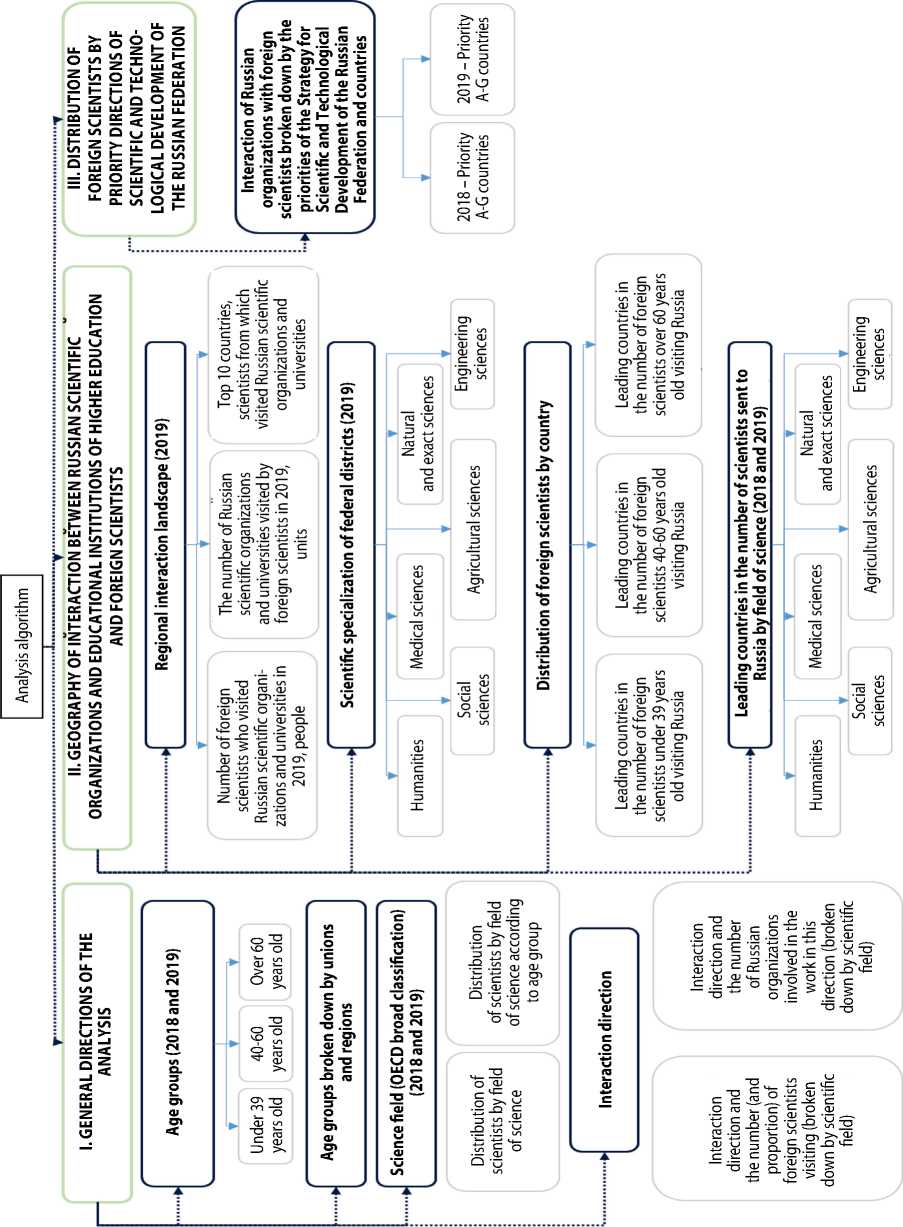
Source: own compilation.
Figure 2. Methodology for monitoring the interaction of Russian organizations with foreign scientists (direction 4)
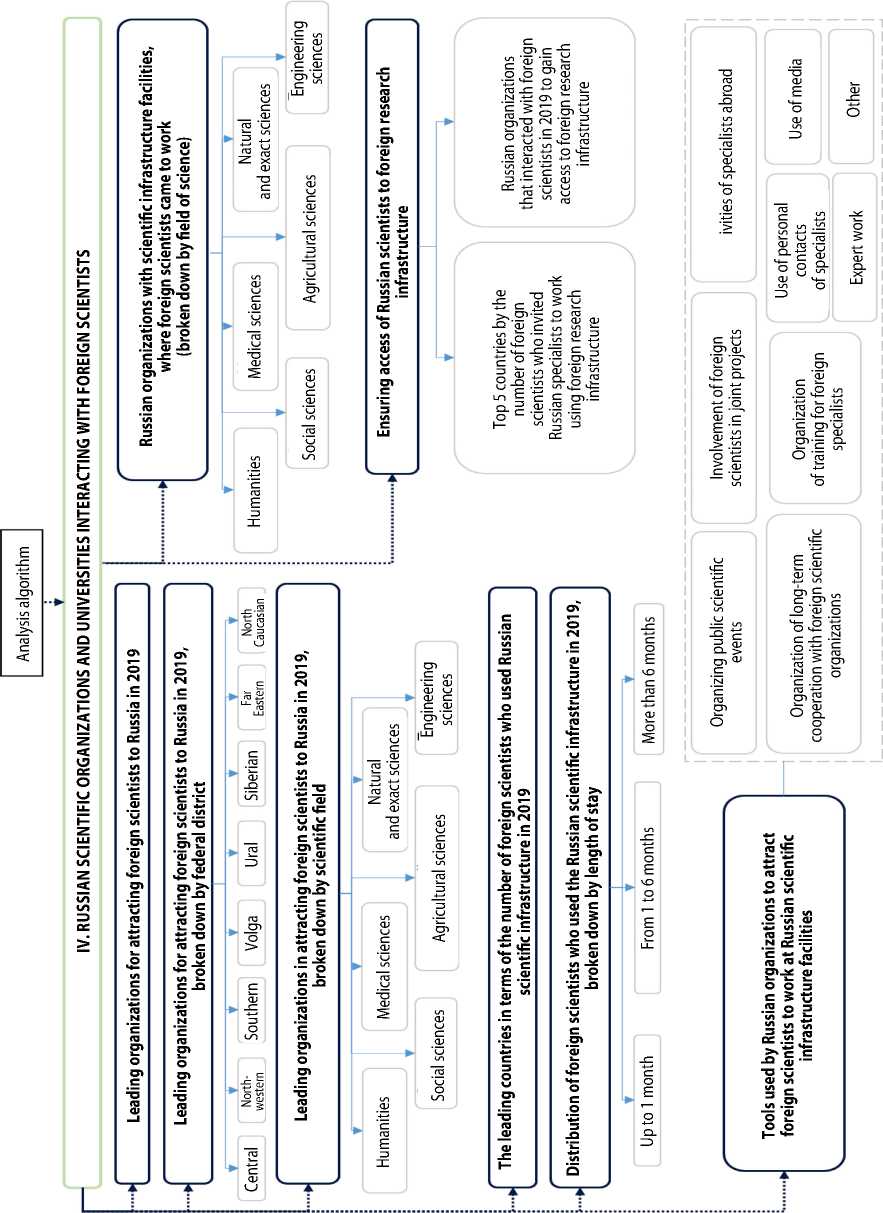
Source: own compilation.
facilities of the Russian research infrastructure were evaluated, and the facilities themselves were presented broken down by field of science. In total, we obtained data on 4,518 scientists who worked at Russian research infrastructure facilities in 162 Russian organizations, broken down by duration of their stay in Russia and the countries from which they arrived. For the purposes of the study, the research infrastructure facilities include research equipment sharing centers, unique scientific installations, scientific collections, the research fleet, and megascience facilities. The results of the analysis in this direction can be used to develop a concept for the promotion of Russian infrastructure facilities abroad.
Monitoring results and their interpretation
The results of monitoring the interaction of scientific organizations with foreign scientists will be presented by stages in accordance with the methodology under consideration.
General lines of analysis
In 2020, the number of Russian organizations that provided information on interaction with foreign scientists increased by 58 units (499 versus 441 in 2019). The number of foreign scientists about whom information was provided increased significantly. First of all, this happened because in 2020 data were received from large organizations that did not participate in the 2019 survey, such as the HSE University, Ural Federal University (UrFU), and Kazan Federal University (KFU).
In 2018 and 2019, mostly established scientists aged 40–60 came to Russia. The proportion of young scientists under 39 years old in 2019 was 26%, while the proportion of older scientists over 60 years old was 15% (Fig. 3).
-
Figure 3. Distribution of foreign scientists by age group, %
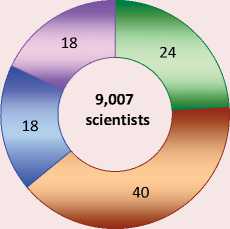
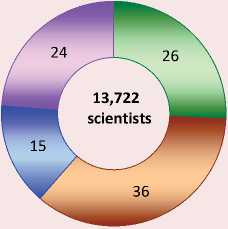
[ЪUp to 39 years old □ 40–60 years old □ Over 60 years old □ No data
Source: own compilation according to the data of the monitoring of interaction of Russian scientific organizations and institutions of higher education with foreign scientists in 2018 and 2019.
Most young foreign specialists came to the organizations of the Siberian Federal District. Thus, 34% of all foreign scientists who visited Siberian scientific organizations and universities were in the age group under 39 years old. The proportion of young scientists among Chinese researchers was especially high: about 39% of all scientists who came to Russia from China in 2019 were under 39 years old.
Younger and older scientists generally have lower mobility rates, but this trend does not apply to scientists coming from Asia (Fig. 4) .
Figure 4. Distribution of foreign scientists by affiliation and age groups, %
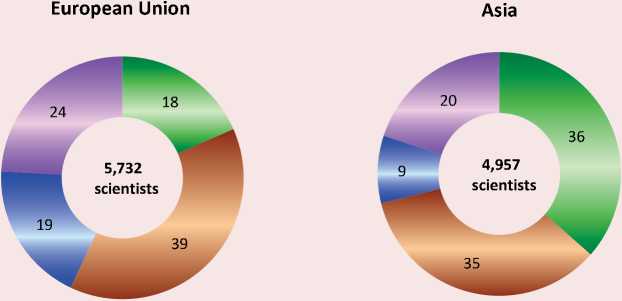
North and South America
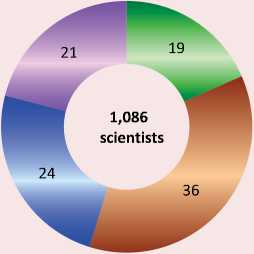
-
□ Up to 39 years old s 40–60 years old в Over 60 years old □ No data
Source: own compilation according to the data of the monitoring of interaction of Russian scientific organizations and institutions of higher education with foreign scientists in 2019.
Young scientists from Asia are much more mobile than their colleagues from other regions, while scientists over the age of 60 came to Russia quite rarely, which can be explained both by the higher level of foreign language skills among young researchers and by national characteristics, such as the state’s priority support for foreign trips and foreign employment for young scientists.
In 2019, the first place in the number of foreign scientists who came to Russia was occupied by representatives of natural sciences, the second and the third by representatives of social sciences and humanities, respectively (Tab. 1) . Representatives of engineering sciences occupied only the fourth position.
We should note that the increase in the number of foreign scientists representing the natural sciences is partially explained by the fact that the Joint Institute for Nuclear Research (JINR), a major international intergovernmental organization based in Dubna (Moscow Oblast) that conducts research in physics, took part in the monitoring in addition to the Russian organizations themselves.
The most common formats of interaction between Russian organizations and foreign scientists are international scientific conferences and joint research projects. Thus, more than 40% of all foreign scientists who came to Russia in 2019
participated in international scientific conferences, panel discussions, symposia and scientific schools (as organizers or invited speakers). Almost one-third of all foreign specialists who came to Russian research organizations and universities participated in joint international research projects with their Russian colleagues (Fig. 5) .
Representatives of the humanities are less often involved in joint international research than scientists from other fields. This is due to the specifics of the research process in this field of science. The humanities are not characterized by the formation of large scientific collaborations; research is much more often carried out by individual scientists.
For foreign specialists in the social sciences, giving short lecture series and holding workshops is more common as a format of interaction with Russian research organizations and universities than for representatives of other sciences.
The main interaction form for foreign scientists representing natural and exact sciences is participation in joint international research projects (including all research projects conducted by JINR).
At the same time, such a format of interaction with Russian scientific organizations and universities as joint research projects and long-term
Table 1. Distribution of foreign scientists by field of science (OECD broad classification)
|
Field of science |
2018 |
2019 |
|
Natural and exact sciences |
2,635 |
5,981 |
|
Social sciences |
1,028 |
2,302 |
|
Humanities |
785 |
2,161 |
|
Engineering sciences |
1,204 |
1,985 |
|
Medical sciences |
247 |
727 |
|
Agricultural sciences |
240 |
265 |
|
No field specified |
2,868 |
301 |
|
Source: own compilation according to the data of the monitoring of interaction of Russian scientific organizations and institutions of higher education with foreign scientists in 2018 and 2019. |
||
Figure 5. Directions of interaction realized by foreign scientists with Russian scientific organizations and educational institutions of higher education, units
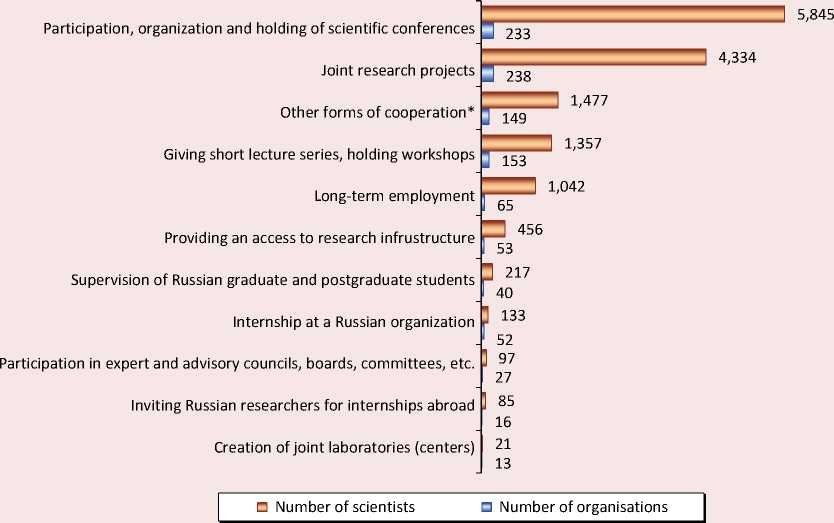
* Other forms of cooperation include study visits, visits to conduct negotiations on possible cooperation, discuss working issues, etc.
Source: own compilation according to the data of the monitoring of interaction of Russian scientific organizations and institutions of higher education with foreign scientists in 2019.
employment is more typical for foreign specialists representing engineering sciences.
Foreign scientists representing medical sciences came more often to learn about and work at Russian infrastructure facilities or to provide Russian specialists with the access to research infrastructure facilities abroad (e.g., biomedical databases).
Such a form of interaction as long-term employment in Russian research organizations and universities is less typical for foreign scientists representing agricultural sciences. However, since relatively few foreign agricultural scientists visited Russian organizations in 2019, this may be a statistical error.
It was revealed that more than 40% of foreign scientists who came to Russia in 2019 interacted with scientific organizations and universities in the Central Federal District, about 20% – with organizations of the Northwestern Federal District.
Geography of interaction between Russian scientific organizations and educational institutions of higher education and foreign scientists
The regional landscape of interaction between Russian organizations and foreign scientists by federal district is shown in Figure 6 .
Thus, the majority of foreign scientists in all federal districts, except for the North Caucasian and Central districts, were representatives of
Figure 6. Regional landscape of interaction between Russian organizations and foreign scientists in the context of federal districts of the Russian Federation
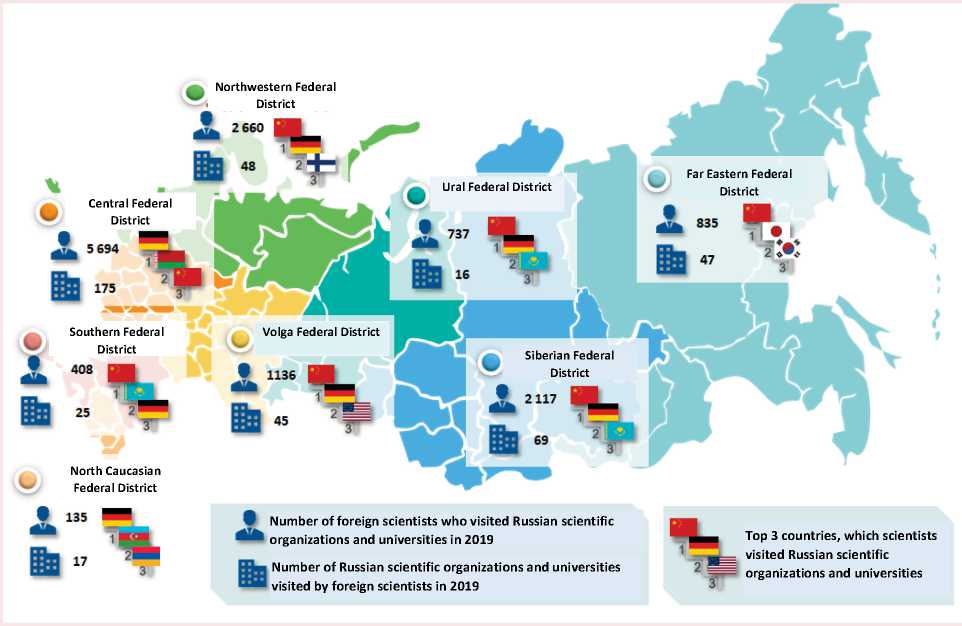
Source: own compilation according to the data of the monitoring of interaction of Russian scientific organizations and institutions of higher education with foreign scientists in 2019.
China, but certain regional specifics can be traced. For example, in the Northwestern Federal District the top three include representatives of Finland, in the North Caucasus – Armenia and Azerbaijan, and in the Far East – Japan and South Korea. In total, scientists representing 133 countries visited Russian scientific organizations and universities in 2019.
Primarily, those foreign scientists who interacted in 2019 with scientific organizations and universities in the corresponding federal districts specialized in the natural sciences (Fig. 7). The exception is the Southern Federal District, where more than 50% of the visiting foreign scientists turned out to be representatives of the humanities (mostly philologists). Representatives of engineering sciences more often chose to visit organizations in the Northwestern and Siberian federal districts, while those dealing with social sciences chose the North Caucasian, Far Eastern, and Central federal districts.
A comparison of the data from the 2019 and 2020 surveys shows that there are strong scientific ties with the EU and Asian countries: the number of scientists who visited Russian scientific organizations and universities remains consistently high, despite the difficult situation with Russia’s international relations. At the same time, scientific
Figure 7. Scientific specialization of federal districts of the Russian Federation according to the 2019 monitoring, %
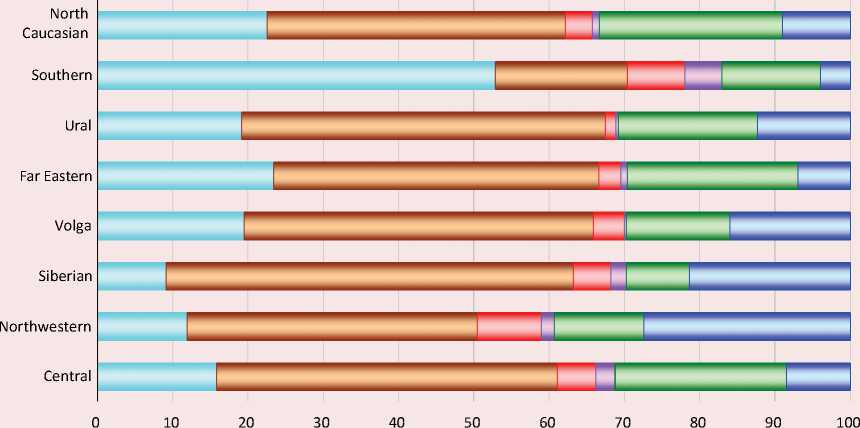
□ Humanities □ Natural and exact sciences □ Medical sciences
□ Agricultural sciences □ Social sciences □ Engineering sciences
Source: own compilation.
contacts with the countries of North and South
America do not cease, but remain limited (Tab. 2) .
Table 2. Number of foreign scientists who came to Russia in 2018–2019, people
|
Region |
2018 |
2019 |
|
EU |
3,864 |
5,732 |
|
Asia |
2,962 |
4,957 |
|
North and South America |
717 |
1,086 |
|
Countries of other regions and unions |
1,464 |
1,947 |
|
Total |
9,007 |
13,722 |
|
Source: own compilation. |
||
In 2019, China ranked first in the rating of countries by the number of scientists coming to Russia (Tab. 3) . This may be due to the geographical proximity of Russia and China, as well as their extensive scientific and technological cooperation, including within BRICS.
Table 3. Top 10 countries from which foreign scientists came in 2019
|
Country |
Number of scientists |
|
China* |
1,903 |
|
Germany |
1,512 |
|
USA |
794 |
|
France |
709 |
|
Kazakhstan |
698 |
|
Belarus |
680 |
|
Italy |
515 |
|
Poland |
476 |
|
Japan |
472 |
|
UK |
448 |
|
Other countries |
5,515 |
|
Total |
13,722 |
|
* Hereinafter the data are for China excluding Taiwan. Source: own compilation. |
|
Young Chinese scientists under 39 years old were particularly active in interacting with
Russian scientific institutions and universities. Among middle-aged foreign scientists, Chinese researchers also ranked first, while among the elderly, researchers from Europe and the United States dominated, including in the age group over 60, the majority of visiting specialists were from Germany.
Active interaction with scientists from China and Germany develops within the framework of joint years of scientific and technical cooperation. Thus, the Russian-German year of scientific and educational partnerships (2018–2020) was opened in 2018. In 2020, the years of Russian-Chinese science and technology and innovation cooperation were opened (2020–2021).
Comparison of the data of the two surveys allows identifying features related to the scientific specialization of the foreign scientists who visited Russia. For example, many scientists from EU countries were representatives of the social sciences and humanities, from Asia – engineering sciences, and from North and South America – humanities (Fig. 8) .
The natural sciences are one of the few scientific fields in which Germany retained the leading position in the number of foreign scientists coming to Russia in 2019 (Fig. 9) . In the social sciences and humanities, the large proportion of specialists come from the United States. At the same time, there was a noticeable decrease in the number of scientists from Ukraine.
-
Figure 8. Foreign scientists who visited Russia, by field of science, people
Engineering sciences
Medical sciences
Social sciences
Natural and exact sciences
Agricultural sciences
Humanities
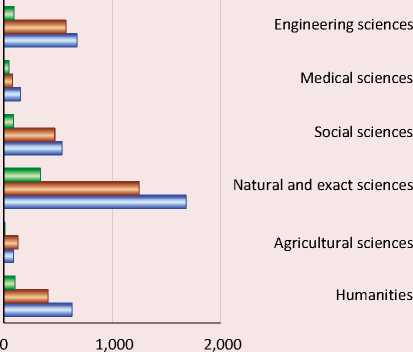
□ North and South America
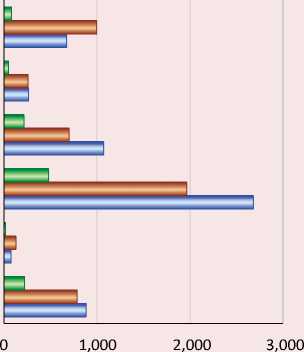
□ Asia □ European Union
Source: own compilation according to the data of the monitoring of interaction of Russian scientific organizations and institutions of higher education with foreign scientists in 2018 and 2019.
-
Figure 9. Leading countries in the number of foreign scientists who came to Russia, representatives of the natural and exact sciences, people
2018 2019
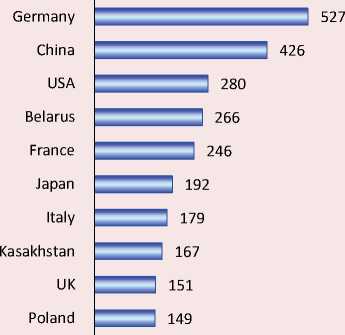
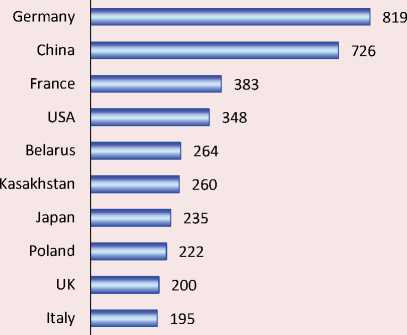
Source: own compilation according to the data of the monitoring of interaction of Russian scientific organizations and institutions of higher education with foreign scientists in 2018 and 2019.
Distribution of foreign scientists by priority directions of scientific and technological development of the Russian Federation
Most foreign scientists whose areas of research interest fall within Priority A of the STD Strategy of Russia mostly came in 2019 to participate in international scientific conferences. Thus, one of the largest events that attracted a significant number of foreign specialists in this area was the international conference “Mechanisms and Nonlinear Problems of Nucleation and Growth of Crystals and Thin Films” (MGCTF’19) organized by Institute for Problems in Mechanical Engineering RAS in Saint Petersburg in July 2019, which was attended by over 70 foreign scientists.
The leaders in attracting foreign researchers in this area in 2019 were SPbPU (330 people), HSE University (308 people), and ETU “LETI” (108 people).
Most foreign scientists whose areas of research interest fall within Priority B came to Russia in
2019 to participate in international scientific conferences. Thus, the 5th International Workshop on Heat/Mass Transfer Advances for Energy Conservation and Pollution Control (IWHT2019) was held in Novosibirsk on August 13–16, 2019 with more than 100 foreign experts, including 98 representatives of Chinese universities and scientific organizations.
The leaders in attracting foreign scientists in this area in 2019 were IT SB RAS (149 people), Perm State University (138 people) and the Karelian Research Center RAS (106 people).
In 2019, more than 220 foreign specialists came to Russia to conduct medical research (Priority B) in various areas. Russian medical scientists from Sechenov University, Almazov National Medical Research Centre, and the Northern State Medical University cooperated especially actively with their foreign colleagues. Sechenov University and Almazov National Medical Research Centre are the initiators of the creation of world-class scientific centers performing research and development on the priority of scientific and technological development (WCRC Digital biodesign and personalized healthcare and WCRC for Personalized Medicine).
According to Priority C, cooperation with Russia’s closest partners in the Eurasian Union, the republics of Belarus and Kazakhstan, is actively developing. Among the main formats of interaction are participation in international conferences and exchange of experience (including mastering skills in advanced research: microbial technology systems, development of microbial fertilizer production). In 2019, a large group consisted of representatives of such organizations as the Institute of Economic Geography (China), L.N. Gumilyov Eurasian National University (Kazakhstan), and SPC NAS of Belarus for Agricultural Mechanization (Belarus).
Priority D includes many diverse disciplines: physics, economics, biology, etc., so the formats of interaction within it were very diverse. Most of the foreign physicists who came to Russia in 2019 worked at JINR or participated in conferences organized at the Budker Institute of Nuclear Physics SB RAS. The main partners of the Russian organizations in this area were German researchers GSI Helmholtz Centre for Heavy Ion Research.
Representatives of economic disciplines most often came to Russia to participate in scientific conferences. The leading organizations in attracting foreign scientists in this area were the HSE University (218 people) and the Financial University under the Government of the Russian Federation (98 people).
The main format of cooperation between Russian scientific organizations and universities with foreign scientists within the framework of Priority F are international research projects. For example, Peter the Great Saint Petersburg Polytechnic University in 2019 was visited by 50 scientists representing the Aero Engine Corporation of China for the purpose of conducting joint research. The leaders in attracting foreign scientists
Figure 10. Interaction of Russian organizations with foreign scientists broken down by priorities of the STD Strategy of Russia
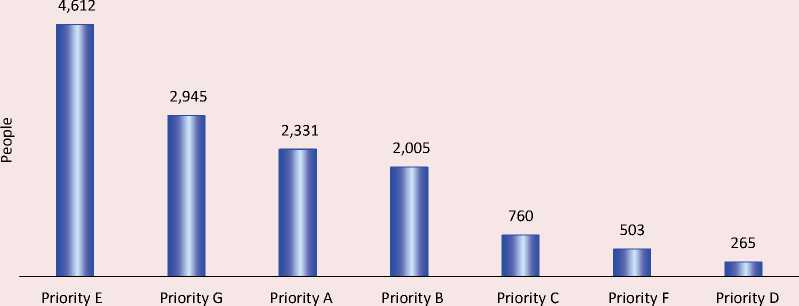
Source: own compilation according to the data of the monitoring of interaction of Russian scientific organizations and institutions of higher education with foreign scientists in 2019.
in this area were SPbPU (144 people), Kant Baltic Federal University (33 people), and Central Aerohydrodynamic Institute (26 people).
Most of the foreign scientists who interacted with Russian research organizations and universities in 2019 under Priority G were from the philological, historical, or pedagogical sciences. The main format of interaction is participation, organization and holding of scientific conferences, workshops and schools in Russia. For example, in November 2019 Kalmyk State University hosted a major international conference on topical issues of Mongolian and Altai studies, which brought together over a hundred leading scientists, including those from Kazakhstan, Mongolia, China, Azerbaijan, and Germany. The leading organizations in attracting foreign specialists in this area were the HSE University (242 people), the Moscow Pedagogical State University (149 people), Kalmyk State University (138 people), and Russian State University for the Humanities (136 people).
Overall, in 2019, the sphere of interest of about a third of all foreign scientists who came to Russia and interacted with scientific organizations and universities belonged to priority E, followed by priorities G and A, with priority D represented the least (Fig. 10) .
Russian scientific organizations and universities interacting with foreign scientists and providing access to research infrastructure
The majority of foreign specialists (1,036 people or 7.5% of the total number of foreign scientists from all organizations) cooperated with the international intergovernmental organization JINR (Central Federal District), the second place was taken by the HSE University (798 people or 5.8%; Central Federal District), the third place – Peter the Great Saint Petersburg Polytechnic University (758
people or 5.5%; Northwestern Federal District). In the top organizations that interacted with foreign scientists by field of science, about a third of the organizations are part of one of the world-class research centers (WCRC).
Most of the foreign specialists who came in 2019 to work at Russian research infrastructure facilities (research equipment sharing centers, unique scientific installations, scientific collections, the research fleet, and megascience facilities) were from the natural and exact sciences. An important area of cooperation for Russian organizations with foreign scientists (primarily representatives of the near abroad) was the provision of research infrastructure in the field of agricultural and medical sciences. The leaders in the number of scientists who used Russia’s scientific infrastructure were China, Germany, and the United States: these countries accounted for almost 1/3 of all foreign researchers arriving in 2019 (Fig. 11) .
Thus, both European and Asian countries are represented in the top 10, from which we can conclude that the Russian research infrastructure is in demand in the world.
In order to work on the Russian research infrastructure, most scientists come to Russia for a short period of time – up to 1 month (78%). The distribution of other foreign specialists who used the Russian research infrastructure in 2019 by duration of stay is as follows: from 1 to 6 months – 12%, more than 6 months – 10%. A small difference between those coming for medium and long periods may mean that foreign researchers who plan to work on the Russian research infrastructure for 1 to 6 months are open to longer stays as well. Provided that the goals of interaction cannot be achieved in a short period, it is worthwhile for organizations to offer foreign scientists forms of interaction involving a longer (more than 6 months) stay.
Figure 11. Top 10 countries in terms of the number of scientists who took advantage of Russian research infrastructure in 2019

Source: own compilation according to the data of the monitoring of interaction of Russian scientific organizations and institutions of higher education with foreign scientists in 2019.
Many organizations create their own brand to attract foreign scientists to research infrastructure facilities and increase their visibility in the world through traditional scientific activities. They hold public scientific events, work with foreign scientists as part of grants, and prepare joint publications. One-fifth of the organizations monitored actively use modern means of communication to disseminate information about the availability of infrastructure. For example, they publish information about themselves and open vacancies, as well as future projects on their sites and partner sites, international job search resources, maintain Internet channels, etc.
The majority of foreign scientists who came to work at Russian research infrastructure facilities in 2019 were representatives of the natural and exact sciences (38 and 20%, respectively). An important area of cooperation between Russian organizations and foreign scientists (primarily representatives of the near abroad) was the provision of research infrastructure for cooperation in agricultural and medical sciences (a little over 20% of all organizations). On the contrary, foreign scientists provided Russian researchers with access to internships and infrastructure-assisted work in international scientific projects in the natural sciences.
Conclusion
Scientific novelty in the context of the problem posed consists in the authors’ developed and tested methodology for monitoring the interaction of Russian organizations with foreign scientists, which allows systematizing the data reflecting the state and performance of science in the field of international scientific and technical cooperation (ISTC), and identifying gaps in scientific knowledge associated with academic mobility.
On the basis of the study the authors identified the parameters for assessing the activities of educational and scientific organizations, the need to take into account the priorities of the STD Strategy of Russia for monitoring and assessing the level of cooperative relationships between Russian and foreign scientists, the methodological framework for monitoring such data.
As a result of approbation of the methodology, we received a significant structured array of data on interaction between Russian organizations and foreign scientists. We identified the following specifics of interaction: age groups of visitors, their scientific specialization, and the main formats of interaction. In addition, we named the countries from which researchers come most often, including broken down by age and scientific specialization. We showed the regional features of interaction with foreign scientists and the specialization of the federal districts. We highlighted the main research interests of foreign scientists who came to Russia in the context of the priorities of the STD Strategy of Russia. We also identified leaders in attracting foreign scientists among Russian organizations. In the analyzed period these are mainly the leading scientific organizations specializing in physics, educational organizations – participants of the Project 5-100. We looked at the specifics of attracting foreign researchers to Russian research infrastructure facilities, including scientific specialization, period of stay, tools of attraction, etc. This information can be used both at the state level for the purposes of strategic planning in the field of ISTC, and at the level of organizations in the formation of ratings and indicators of their performance.
The analysis revealed that the most promising form of interaction with foreign scientists was to invite them to work in Russian research equipment sharing centers at unique Russian scientific facilities, megascience facilities, using scientific collections and the research fleet. Accordingly, Russian scientists could work just as effectively at similar sites abroad.
In the current context of actual ban on movement between countries for the purpose of organizing the survey the following year, the questionnaire was amended to identify online formats for interaction with foreign scientists and the platforms used by Russian organizations as part of such interaction. We have also added information on international classification codes to better identify the direction of the scientist. We supplemented the questionnaire with information about a foreign researcher’s diaspora affiliation, since some foreign scientists are representatives of the Russian-speaking diaspora who maintain close contacts with colleagues from Russia and Russian organizations, where they often were in training. Of great importance in the realization of international scientific contacts are the legislative norms that hinder (favor) effective international cooperation on the territory of Russia. For such an assessment, the questionnaire includes questions related to the need to make changes aimed at regulating the international activity of organizations on the territory of the Russian Federation.
Список литературы Methodology for assessing regional specifics of interaction between foreign scientists and Russian scientific organizations and universities
- Antoshchuk I.A., Ledeneva V.Yu. (2019). From Russia to the UK. On migration mechanism of young Russian computer scientists. Sotsiologicheskie issledovaniya=Sociological Studies, 2, 108–118. DOI: 10.31857/S013216250004015-9 (in Russian).
- Azoulay P., Zivin J.S.G., Sampat B.N. (2011). The diffusion of scientific knowledge across time and space: Evidence from professional transitions for the superstars of medicine. In: The Rate and Direction of Inventive Activity Revisited. Chicago: University of Chicago Press. DOI: https://doi.org/10.3386/w16683
- Bolli T., Schläpfer J. (2015). Job mobility, peer effects, and research productivity in economics. Scientometrics, 104, 629–650.
- D’yachenko E.L., Nefedova A.I., Strel’tsova E.A. (2017). Recruitment of foreign scientists in Russian research organizations and universities: Opportunities and barriers. Universitetskoe upravlenie: Praktika i analiz=University Management: Practice and Analysis, 21(5), 132–143. DOI: 10.15826/umpa.2017.05.069 (in Russian).
- Dostie B., Léger P. (2009). Self-selection in migration and returns to unobservable skills. Journal of Population Economics, 22(4), 1005–1024. Available at: https://www.iza.org/publications/dp/1942/self-selection-in-migration-and-returns-to-unobservable-skills
- Drugova E.A., Nuzhina N.I., Koryakovtseva P.V. (2016). International academic recruitment at the leading Russian universities: Current position and prospects of further development. Universitetskoe upravlenie: Praktika i analiz= University Management: Practice and Analysis, 101(1), 32–43 (in Russian).
- Dubois P., Rochet J.-C., Schlenker J.-M. (2014). Productivity and mobility in academic research: Evidence from mathematicians. Scientometrics, 98, 1669–1701.
- Dyachenko E.L. (2017). Internal migration of scientists in Russia and the USA: The case of physicists. Scientometrics, 113(1), 105–122. DOI: https://doi.org/10.1007/s11192-017-2478-8
- Ejermo O., Fassio C., Källström J. (2020). Does mobility across universities raise scientific productivity? Oxford Bulletin of Economics and Statistics, 82(3), 603–624. DOI: https://doi.org/10.1111/obes.12346
- Gahungu A. (2011). Integration of foreign-born faculty in academia: Foreignness as an asset. The International Journal of Educational Leadership Preparation, 6(1), 1–22.
- Gomez C.J., Herman A.C., Parigi P. (2020). Moving more, but closer: Mapping the growing regionalization of global scientific mobility using ORCID. Journal of Informetrics, 14(3). DOI: https://doi.org/10.1016/j.joi.2020.101044
- Halevi G., Moed H. F., Bar-Ilan J. (2016). Researchers’ mobility, productivity and impact: Case of top producing authors in seven disciplines. Publishing Research Quarterly, 32, 22–37.
- Koksharov V.A., Agarkov G.A. (2018). International scientific migration: Progress or a threat to Russia’s scientific and technological security. Ekonomika regiona=Economy of Region, 14(1), 243–252. DOI: 10.17059/2018–1–19 (in Russian).
- Melikyan A.V., Zheleznov B.V. (2012). A portrait of an international employee of a Russian higher education institution. Voprosy obrazovaniya=Educational Studies Moscow, 4, 259–277 (in Russian).
- Robinson-Garcia N. et al. (2019). The many faces of mobility: Using bibliometric data to measure the movement of scientists. Journal of Informetrics, 13(1), 50–63. DOI: https://doi.org/10.1016/j.joi.2018.11.002
- Welch A.R. (1997). The peripatetic professor: The internationalization of the academic profession. Higher Education, 34, 323–345.
- Yurevich M.A., Aushkap D.S. (2018). Brain drain in computer and information sciences: A bibliometric estimate. Informatsionnoe obshchestvo=Information Society, 6, 46–53 (in Russian).
- Zadumkin K.A., Terebova S.V. (2009). The international technical and scientific cooperation: The nature, content and forms. Problemy razvitiya territorii=Problems of Territory’s Development, 3, 22–30 (in Russian).
- Zheleznov B.V., Melikyan A.V. (2012). Participation of international faculty in the development of Russian universities. Universitetskoe upravlenie: Praktika i analiz=University Management: Practice and Analysis, 82(6), 38–44 (in Russian).
- Zolotarev D.V. et al. (2019). Monitoring of interaction of Russian scientific and educational organizations with foreign scientists. Upravlenie naukoi i naukometriya=Science Governance and Scientometrics, 14(2), 292–330. DOI: https://doi.org/10.33873/2686-6706.2019.14-2.292-330 (in Russian).

